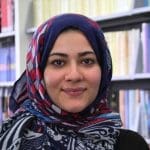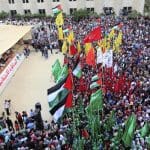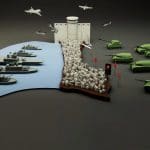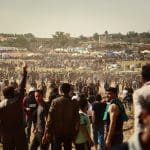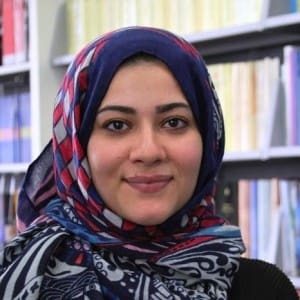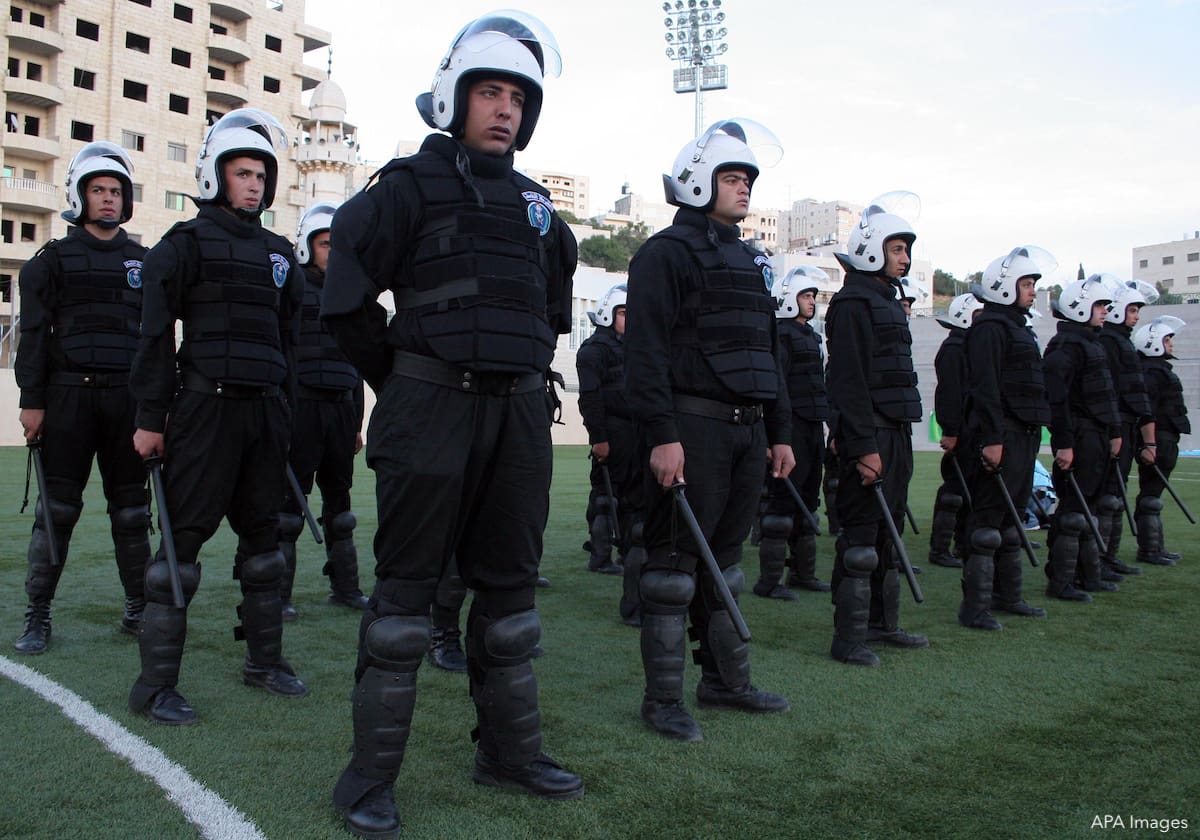
Overview
Israel’s 51-day assault on Gaza calls for redoubled efforts to shake off its carefully constructed system of control of Palestinian lives throughout the Occupied Palestinian Territory (OPT) and secure Palestinian rights. A necessary first step must be to address the donor-supported creation of Palestinian security forces that primarily serve Israel’s colonial ambitions. This is increasingly urgent with the PA set to move back into Gaza in the wake of the unity deal.1
Al-Shabaka Policy Member Sabrien Amrov and Program Director Alaa Tartir tackle these issues by examining the state of the security sector today, its origins and purposes, and the fast-growing authoritarianism that is turning “Palestine” into a security state. While touching on the Gaza security sector, they focus primarily on its development in the West Bank. They urge that the foundations of security sector reform be challenged as a key step towards setting the Palestinian quest for freedom, justice, equality, and self-determination back on track.
A Burgeoning Sector
Over the past decade the security sector has grown faster than any other part of the Palestinian Authority (PA). More public servants are now employed in the security sector than in any other sector – 44% of a total of 145,000 civil servants. A growing number of “security science” schools and university programs have been created, including the Palestinian Center for Security Sector Studies in Jericho, considered the most prestigious in the West Bank, and thousands of Palestinians students travel abroad to receive “world class” security training.
Security eats up a sizeable proportion of the PA budget, accounting for almost $1 billion (26%) of the 2013 budget, compared to only 16% for education, 9% for health, and a staggeringly low 1% for agriculture, traditionally one of the main sources of livelihood for Palestinians. The security sector is also the recipient of considerable international aid: the United States, the European Union, and Canada pumped millions of dollars into what is euphemistically termed Security Sector Reform (SSR) in 2013 alone. In fact, there is now one security person for every 52 Palestinian residents compared to one educator for every 75 residents. Daily newspapers frequently carry announcements of bids for more PA prisons – there are already 52 new prisons and eight new security compounds – as well as riot control gear.
An important indicator of the growing importance of the security sector has been the appointment of security personnel to leading positions or in municipalities, governorates, and politically sensitive positions. For example, Majid Faraj, head of Palestinian Intelligence, was on the Palestinian negotiating team in the most recent negotiations with Israel. Although security force heads like Jibril Rajoub and Mohammed Dahlan have been powerful in the past (and may be again in future), what is different now is that this is being presented as part of a modern state-building package.
Needless to say, far from providing for Palestinian security, the rapidly mushrooming sector has, as Israel intended from the start, served as an instrument of control and pacification of the Palestinian population in the area directly under the PA’s authority (Area A, according to the Oslo Accords) as well as the area controlled jointly with Israel (Area B). In these areas, Palestinian security forces have curbed demonstrations, arrested activists, violently disarmed the military wings of political parties, and tortured militants as well as political activists. At the same time, security collaboration with Israel has reached unprecedented levels, as will be discussed further below. Meanwhile, Israel has a free hand in Area C, some 60% of the West Bank, which is under its military control.
The Evolution of the Security Sector
Today’s PA security sector has its origins in the Oslo Declaration of Principles in 1993, in which Article VIII envisages a “strong police force” for the Palestinians while Israel maintains responsibility for “external threats” as well as the “overall security of Israelis.” This was further spelled out in Annex I of the Interim Agreement (Oslo II) in 1995 with a protocol on joint Israeli-Palestinian security operations, as were Israeli specifications of the size of the force and the number and type of weapons with the procedures for registering them. In other words, the PA playing the role of sub-contractor to Israel was foreseen in the Oslo Accords.
Ironically, the “strong police force” led in part to the violent intensification of the 2nd Intifada and to Israel cracking down on the Palestinian police as well as on other government institutions. It was in 2002, at the height of the 2nd Intifada and Israel’s invasion of Palestinian cities, that both former US President George W. Bush and the late Israeli Prime Minister Ariel Sharon highlighted the security elements of the Road Map for Peace later launched in 2003 by the Quartet. As Bush declared in 2002, “The United States will not support the establishment of a Palestinian state until its leaders engage in a sustained fight against terrorists and dismantle their infrastructure. This will require an externally supervised effort to rebuild and reform the Palestinian security services.” Thus, self-determination for the Palestinians went from being a right to a privilege that the PA had to demonstrate it deserved.
The Road Map further consolidated the PA’s shift of its statehood strategy from a struggle for self-determination to acquiring a security sector that would in theory be governed by the “principles of democratic governance and rule of law” but in fact serves Israel. Indeed, Phase I of the Road Map demanded that the PA undertake “visible efforts” to arrest individuals and groups “conducting and planning violent attacks on Israelis anywhere.” The conditions on the Palestinian security sector included: Combat terrorism; apprehend suspects; outlaw incitement; collect all illegal weapons; provide Israel with a list of Palestinian police recruits; and report progress to the United States. Thus the evolution of the Palestinian security sector has been “an externally-controlled process” that is clearly “driven by the national security interests of Israel and the United States.”2
At the same time, it is important to note that the PA under Abbas, first as prime minister and then as president since 2005, had its own reasons to adopt this framework. Abbas wished to establish a monopoly over the use of force and to cement his leadership after he took over the reins from the late Palestinian leader Yasser Arafat, as well as to protect PA elites, as our colleague Al-Shabaka Policy Advisor Tariq Dana noted in a recent piece. Furthermore, the PA had a vested interest in cracking down on Islamist as well as other opposition parties in the West Bank, particularly in the wake of the Hamas victory in the 2006 Palestinian legislative elections and the Fatah-Hamas schism since 2007. The development industry’s efforts to reinvent the Palestinian security forces gained momentum after Salam Fayyad became prime minister in 2007, all in the name of a state-building enterprise.
Despite clear and growing PA violations of the rule of law, international donors and the PA itself have continued to sell SSR as having the purpose of providing efficient and impartial justice and safeguarding human rights.3 Rule of law in the context of prolonged military occupation, however, is a non-starter, to put it politely. As a Western diplomat involved in security training admitted in an International Crisis Group report on the subject, “The main criterion of success is Israeli satisfaction. If the Israelis tell us that this is working well, we consider it a success.”
A discussion of the security sector in the Gaza Strip is beyond the scope of this brief, but a few words are in order about the similarities between the Fatah-led PA in Ramallah and the Hamas-led authorities in Gaza. Of the 23,000 civil servants employed by the Hamas-led authority, 15,500 work in the security sector. Just as the PA keeps a grip on power in the West Bank by intimidating other militant groups, Hamas does so in Gaza. For example, the Ramallah-based Independent Commission on Human Rights reported that of the 3,185 complaints it had received in 2012 of violations by security agencies as well as civil institutions, 2,373 were from the West Bank and 812 from Gaza. It remains to be seen how the unity government’s entry into Gaza will affect its security sector.
Part of Hamas’ effort to keep control of the Gaza Strip has aimed at upholding ceasefires with Israel. Thus, ironically, Hamas has in this respect been the best guarantor of Israel’s security since Israel’s blockade of the Gaza Strip began in earnest in 2006 – although, as veteran analyst Mouin Rabbani has pointed out, Hamas’ coordination with Israel differs from that of Fatah, being “informal and arguably tactical.” Hamas’ ability to uphold its ceasefires with Israel is something Israeli analysts have acknowledged although that has not prevented Israel from launching increasingly destructive assaults on Gaza to “mow the lawn,” the euphemism they use for their deadly approach to Gaza.
Oppression by a Police State in the Making
Today, the end result of SSR has been to reinforce PA authoritarianism to an unprecedented degree. As Nathan Brown argued in discussing the authoritarian context of SSR, “The entire program is based not simply on de-emphasizing or postponing democracy and human rights but on actively denying them for the present.” Yazid Sayigh concluded that reform in the security sector resulted in an authoritarian transformation that will threaten not only long-term security but also the ability to achieve Palestinian statehood. If ever there is a Palestinian state, it is likely to be as much of a police state as those of most other Arab regimes.
A brief review of what West Bankers are enduring under the PA today shows that for many, the PA has already become a police state through which they are dealing with multiple layers of oppression from both Israel and the PA. This is reflected in the difference in language used between the PA and the people: The PA describes PA-Israel joint work as coordination (tansiq), whereas the people use the word collaboration (ta’awoun) in its negative connotation. Some Palestinians speak of a “revolving door” policy whereby prisoners are released from one authority’s prison to enter another’s. A respondent from Jenin refugee camp said: “After the PA’s Preventative Security Forces arrested and imprisoned me for nine months because I’m a member of Hamas, three weeks after my release, Israel arrested me and accused me of the same exact issues. Literally they used the same words.”4
This explanation by a high official from the Preventive Security Forces says it all: “We get lists with names. [The Israelis] need someone, and we are tasked to get that person for them.” This has been the approach for years, as was highlighted in the 2010 assessment by the International Crisis Group, “the General Intelligence Service (Shin Bet) provides its Palestinian counterparts with lists of wanted militants, whom Palestinians subsequently arrest. IDF and Israeli intelligence officials [say] ‘coordination has never been as extensive’, with ‘coordination better in all respects.’”
While repression by the PA security forces occurs on a continuous basis and takes different forms, it is worth highlighting specific examples to show the extent to which PA forces are willing to go to repress public dissent. In mid-2012, PA security forces cracked down on a peaceful rally in Ramallah and as a result five protesters had to be taken to hospital, with over 18 of them filing complaints. The injuries meted out to one protester in police custody were so severe that Amnesty International said that they amounted to torture.
Another Amnesty International report in 2013 found that police brutality had led to the death of two Palestinians: A 44-year old woman was killed during a police raid on a village that severely injured eight others and sparked protests by hundreds of locals and clashes with security forces, and a second Palestinian was killed in a separate operation at ‘Askar refugee camp in Nablus. It described the overall brutality meted out as “shocking even by the standards of the PA security forces.”
In a glaring echo of the Israeli justice sector’s treatment of Palestinian attempts to secure their rights to life, land, and liberty, Palestinian courts have not found “any West Bank security officers responsible for torture, arbitrary detention, or prior cases of unlawful deaths in custody […] [or] prosecuted officers for beating demonstrators in Ramallah on August 28,” according to a 2013 Human Rights Watch report. This is the case even when the police officers are known. In fact, the authorities sometimes go so far as to prosecute the victims as happened after police assaulted activists in April 2014. In effect, the security forces have the leverage to use the judicial system to their advantage. So much for the rule of law under SSR programs.
Moreover, repression is not confined to demonstrators or “wanted” people, that is, those Palestinians wanted by Israel. The Euro-Med Observer for Human Rights recently reported that in 2013, Palestinian security forces had arbitrarily arrested 723 persons and interrogated 1,137 without clear charges, court decisions, or warrants. Additionally, the PA security forces arrested 56 persons because of Facebook status against them, arrested 19 journalists, and a number of cartoonists and writers. It further documented 117 cases of extreme torture.
Nowhere is the PA’s security collaboration with Israel more evident than in the West Bank’s refugee camps, deepening the isolation of the camps’ residents from the rest of society and eradicating and criminalizing residual Palestinian armed resistance. The treatment of Jenin refugee camp is the best example of this approach. Devastated by Israeli forces during the 2nd Intifada despite heroic resistance, Jenin began in 2007 to be used as a pilot governorate by the Fayyad government, international donors, and Israel for strengthening the rule of law. Under the guise of “Operation Hope and Smile,” PA forces were mandated to remove any source of “terror and unstability” from the camp.
The oppression of Jenin has continued to this day. For example, between August and October 2013, a period when the talks sponsored by US Secretary of State John Kerry talks were underway, Palestinian security forces and the Israeli military conducted over 15 raids against the Jenin refugee camp (see this report in Maan News Agency for example). In March 2014, Israeli military forces stormed the Jenin refugee camp, assassinating three people and wounding at least 14 others. It was alleged that Palestinian security services in the area were told to stay in their office before the raid. Palestinian security forces are also even used to intimidate Palestinians who dare criticize their actions or the actions of PA officials: In May 2014, for example, Palestinian security forces and the guards of the governor of Jenin brutally assaulted a Palestinian civilian after he was overheard making a sarcastic comment about the governor’s procession through the city.
The experience of Jenin demonstrates that the armed resistance that was once considered an inseparable part of the Palestinian struggle for self-determination is being dealt with by the PA as a form of dissent that needs not just policing but eradication and criminalization. Thus, a broader objective of SSR has been to criminalize resistance against the occupation and leave Israel – and its trusted minions – in sole possession of the use of arms against a defenceless population.
The success of the Israel- and US-framed and PA-implemented SSR depends on the way in which Palestinian security forces are conditioned to condition themselves. This self-conditioning is visible at different levels beginning with top government officials. Abbas holds regular meetings with the security forces and repeatedly orders them to rule with an iron fist. The spokesman of the PA security forces, Adnan al-Dimiry, went so far as to suggest that security forces have created a security miracle and that the West Bank is even more secure then Israeli cities.
Even more alarming are the occasions when young Palestinians who are training in the security forces reveal this self-conditioning. As a student from the Turkish academy admitted “It’s messy, but we need to show that we can do this. After that, when we get our state, we can run it so that we can benefit from it.” Indeed, the young Palestinian men and women who join the security forces perhaps embody the duality between being the subject of the occupation and the collaborator in its purest form. When close to half of the Palestinian public sector is given over to jobs in the security sector the decision is almost made for you.
In Ramallah, a group of police officers admitted that even though it is agreed that Israelis are strictly not allowed to come into Area A, when they do, “they call us, and our superiors tell us to put down our arms and go inside. We are not even allowed on the streets or in our police cars if they decide to come in for incursions. If they say disappear, we disappear. Who is going to stop them? No one.”
Several analysts have noted the impact of such conditioning. Law professor 24378 suggests that security coordination itself is a form of conditioning: “The Palestinian struggle finds itself in a time where it’s no longer about self-determination – it’s about international reputation, about proving that you deserve to run your own state, and the coordination is a form of discipline where international donors, along with the colonizing power, are conditioning the future state of Palestine.” Political scientist Mandy Turner argues that the state-building enterprise is a form of counterinsurgency but that it takes time to blossom precisely because it needs to socialize the colonial subject into conditioning itself to the standards imposed by neoliberal principles.
A Call to Palestinians to Reform the “Reform”
The “Palestine Papers” leaked by Al Jazeera, including detailed documents from Israeli-Palestinian meetings in Annapolis in 2008, reveal that to some extent Palestinian leaders still believed that if they did everything that donors asked of them in terms of security they would get a state (see, for example, Saeb Erekat here). Yet, Palestinians are further than ever from securing a state. Moreover, Israeli Prime Minister Benjamin Netanyahu finally made it clear during Israel’s summer 2014 assault on Gaza that Israel would never relinquish security control west of the river Jordan. The myth that the millions of dollars that donors have been pouring into the Palestinian security sector would serve a state-building enterprise has been exposed for what it is.
Security Sector Reform as it has been conducted in the OPT has distorted the national struggle and its priorities with the aim of disempowering the Palestinian people’s ability to resist colonial subjugation. It has broken the direct line of sight between the Palestinians living under occupation and the Israeli occupation forces and contributed to the creation of a new elite of security practitioners who abuse their powers and project the humiliation they face by Israeli forces onto Palestinian civilians.
The question is: What impact will Israel’s 51-day assault on Gaza this summer have on the security sector in the OPT? Before the start of the assault, there appeared to be little change: Israel’s Gaza operation began hard on the heels of the June 2014 Israeli crackdown on the West Bank, which saw an intensified PA crackdown on Palestinian protestors both in tandem with Israeli forces and on their own. Soon afterwards, Abbas played the nationalist card to respond to Palestinian and global outrage about the assault on Gaza, and the Palestinian team negotiating a ceasefire in Cairo included all factions. However, after the assault was over, Fatah and Hamas began trading accusations again, but their end-September agreement to allow the unity government to function in Gaza may lead to a working relationship. It is too soon to judge the impact this will have on the security sector in either Gaza or the West Bank.
Regardless, security reform under occupation is fundamentally flawed: The more the PA invests in security reform, the more it entrenches the occupation and the more it is obliged to work as Israel’s sub-contractor. There is an urgent need to move away from the securitized development paradigm that was built under Abbas and strengthened under Fayyad and instead address the real development needs of the OPT. The fact that the number of families receiving financial assistance increased from 30,000 to 100,000 between 2007 and 2010 is evidence, should it be necessary, that PA arguments that better security conditions will lead to better economic conditions are hollow.
Below are four recommendations addressed to Palestinian civil society and their supporters at home and abroad so as to begin the work that can and must be done to reform “security sector reform.”
First and most importantly, Palestinian civil society organizations should use the media, public forums, and other outreach to shift the discourse and reject the notion that resistance against the occupation should be criminalized. All people living under occupation have the right to resist, whether it is through demonstrations, through speech and writing, or to defend against armed attacks. Indeed, criminalizing resistance to the occupation is the crime itself.
Secondly, civil society needs all its creativity to find ways to institute checks and balances. The key to successful security reform is public accountability and ownership. Neither exists in the Palestinian context given the lack of any Palestinian checks and balances and independent oversight, to say nothing of the all-encompassing Israeli occupation. PA officials claim they “are abiding by international standards,” but without a functioning parliament, an independent ombudsman office, or effective recourse to the judiciary, these words are meaningless. Until such checks and balances are introduced, SSR will be part of the problem and not part of the solution.
Thirdly, investment needs to be found for alternative economic opportunities to enable people to survive as well as to continue the struggle against the multiple layers of oppression without being forced to work in the bloated and repressive security sector.
Finally, the boycott, divestment, and sanctions (BDS) movement has given many Palestinians and their supporters renewed hope in the effectiveness of non-violent tools of resisting oppression and securing rights. Some of its organizing principles and practices can be applied in the efforts to lift the yoke of the security state.
- Al-Shabaka publishes all its content in both English and Arabic (see Arabic text here.) To read this piece in French, please click here. Al-Shabaka is grateful for the efforts by human rights advocates to translate its pieces into French, but is not responsible for any change in meaning.
- Hussein Agha and 24352, _A Framework for a Palestinian National Security Doctrine_ (London, UK: Royal Institute for International Affairs/Chatham House, 2005).
- For more information, see Roland Friedrich and Arnold Luethold, Entry-Points to Palestinian Security Sector Reform (Switzerland: Geneva Centre for the Democratic Control of Armed Forces (DCAF), 2007).
- Unless otherwise specified, quotations are from interviews by each of the two authors in Ramallah, Birzeit, Bethlehem, Nablus, Jenin, and Ankara in 2012, 2013, and 2014.






